|
|
|
Sort Order |
|
|
|
Items / Page
|
|
|
|
|
|
|
| Srl | Item |
| 1 |
ID:
154070
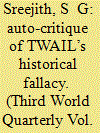

|
|
|
|
|
| Summary/Abstract |
Third World Approaches to International Law (TWAIL) has been impactful in international law scholarship. However, many of its epistemic approaches, especially its active historicising, have often turned counterproductive to its objective of securing freedom for the peoples of the Third World. Moreover, pursuing the colonial past through weighty polemics has rendered TWAIL a discourse that engenders anti-Western sentiments. Further, TWAIL’s dialectic means of resistance and opposition to a past-influenced present ingrained in international law and systems, which are at the disposal of the West, have the reverse effect of dialectically imposing a Western otherness on TWAIL. Hence, an alternative manifesto is sketched, which, while it disagrees with the exclusion of the West in social production, refuses to privilege the West through a Hegelian dialectic of otherness. The alternative manifesto proposes an alternative dialectic wherein the otherness is a ‘universal’ in the self-consciousness of the subjects. It is a dialectic of inclusion and open participation. The article also attempts to situate the new dialectic in international law.
|
|
|
|
|
|
|
|
|
|
|
|
|
|
|
|
| 2 |
ID:
148286
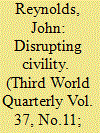

|
|
|
|
|
| Summary/Abstract |
This paper is a reflection on the role of intellectuals in engaging with Palestinian solidarity movements and liberation discourses, and on the place of international lawyers specifically within that context. The paper considers ‘the question of Palestine’ as a rigorous test for intellectuals in the Global North today, and examines particular debates over free speech, civility and balance that unfolded in the wake of Israel’s 2014 war on Gaza. It considers the interventions of international lawyers in these debates with reference to Edward Said’s ‘amateur’ and ‘professional’ intellectuals, and explores ways in which anti-colonial international lawyers (as amateur intellectuals) can transcend prevailing professional orthodoxies to deploy language, arguments or tactics that rupture liberal legal processes and narratives on Palestine.
|
|
|
|
|
|
|
|
|
|
|
|
|
|
|
|
| 3 |
ID:
157171
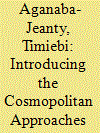

|
|
|
|
|
| Summary/Abstract |
Third World Approaches to International Law or TWAIL is a useful starting point to assess space governance issues from the perspective of emerging or aspirant space actors and users because it helps to highlight imbalances and asymmetry around the supposed “legal right” to space benefit under Article I(1) of the Outer Space Treaty. However, a new analytical lens focused on Cosmopolitan Approaches to International Law or CAIL is proposed that can deconstruct the existing agenda in light of it obscuring the idea of shared benefits without attributing blame, scepticism or negativity, a charge often placed against TWAIL perspectives. This paper asks what one learns from the space law context that prompts us to reorient the frame of analysis that TWAIL perspective brings to bear and focus on a CAILian perspective. Primarily that a TWAILian approach is too one sided and polarized and that a CAILian approach acknowledges reciprocal responsibilities. It highlights the implications of the approach both for emerging and aspirant as well as established space nations specifically and for global space governance in general.
|
|
|
|
|
|
|
|
|
|
|
|
|
|
|
|
| 4 |
ID:
148285


|
|
|
|
|
| Summary/Abstract |
In starting from the simple question, ‘Why didn’t the field of constitutional studies ever generate a school of thought akin to TWAIL?’, this article seeks to sketch the contours, obstacles and promises of Southern constitutionalism. In confronting the intra-, meta-, and extra-disciplinary challenges to such a project, the article defines the ‘South’ of Southern constitutionalism, not the ‘South’ of the developed ‘North’, but rather the ‘South’ of the modernist hopes in – and the post-modernist disappointments with – the templates of Western constitutional imagination.
|
|
|
|
|
|
|
|
|
|
|
|
|
|
|
|
| 5 |
ID:
148278
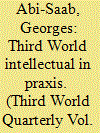

|
|
|
|
|
| Summary/Abstract |
In his closing keynote address for the TWAIL Cairo Conference, Professor Georges Abi-Saab engages with the conference theme ‘On Praxis and the Intellectual’ by considering the diverse roles that can be played by Third World international law intellectuals in trying to transform theory into social practice. He commences with an overview of the Third World’s engagement with international law thus far in the form of a ‘three act psychodrama’. Following from this, he explores the meanings of the terms ‘intellectual’ and ‘praxis’, noting that not all international lawyers are the former, and breaking the latter down into several stages in the spectrum between reflection and action. Professor Abi-Saab concludes with some examples of praxis from personal experience, including as a professor, teacher, and scholar of international law, ghostwriting for the UN Secretary-General, participation in country delegations, and as judge and arbitrator in numerous courts and tribunals. Through these examples he illustrates some of the different tactics available to the Third World intellectual including confrontation, participation, or operation ‘behind enemy lines’.
|
|
|
|
|
|
|
|
|
|
|
|
|
|
|
|
| 6 |
ID:
148277
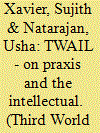

|
|
|
|
|
| Summary/Abstract |
This Special Issue emerges from the Third World Approaches to International Law (TWAIL) Cairo Conference in 2015 and addresses the conference theme, ‘On Praxis and the Intellectual’, by focusing on different aspects of the intellectual as a political actor. In introducing this Issue, we provide some background to the TWAIL network, movement, event, and publications; and delineate our own understandings of scholarly praxis as editors and conference organisers. Broadly, we understand praxis as the relationship between what we say as scholars and what we do – as the inextricability of theory from lived experience. Understood in this way, praxis is central to TWAIL, as TWAIL scholars strive to reconcile international law’s promise of justice with the proliferation of injustice in the world it purports to govern. Reconciliation occurs in the realm of praxis and TWAIL scholars engage in a variety of struggles, including those for greater self-awareness, disciplinary upheaval, and institutional resistance and transformation.
|
|
|
|
|
|
|
|
|
|
|
|
|
|
|
|
|
|
|
|
|